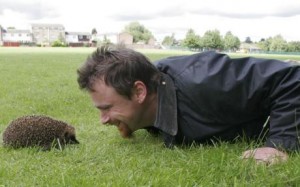 Although you may not have spent much time contemplating the character of hedgehogs and our relationship with them, I know a man who has. Ecologist Hugh Warwick is the author of a brilliantly funny and engaging book called A Prickly Affair: The Charm of the Hedgehog, which has just come out in paperback, receiving rave reviews in The Guardian and elsewhere. I spoke with him about his mania for hedgehogs and what his researches around the world – he tracked down a hedgehog in China named Hugh and attended the International Hedgehog Olympic Games in the Rocky Mountains – reveal about our understanding of human empathy with animals.
Although you may not have spent much time contemplating the character of hedgehogs and our relationship with them, I know a man who has. Ecologist Hugh Warwick is the author of a brilliantly funny and engaging book called A Prickly Affair: The Charm of the Hedgehog, which has just come out in paperback, receiving rave reviews in The Guardian and elsewhere. I spoke with him about his mania for hedgehogs and what his researches around the world – he tracked down a hedgehog in China named Hugh and attended the International Hedgehog Olympic Games in the Rocky Mountains – reveal about our understanding of human empathy with animals.
Roman Krznaric: You’ve written a whole book about hedgehogs, and were described in a recent review as having an ‘endearingly batty’ obsession with them. Why do you personally care about these creatures so much?
Hugh Warwick: I started studying the ecology of hedgehogs nearly 25 years ago. To begin with I was just fascinated by how little we knew about this charismatic animal. But the more time I spent with hedgehogs, the more I came to realise that they have a wonderful quality. They endear themselves to people, they are attractive, quirky and eccentric. But my epiphany came on a night out with Nigel – when I ended up nose-to-nose with this hedgehog I was radio-tracking. As he looked up at me and our eyes met I became aware that there is no other wild creature we can do this with. I had a glimpse of his essential wildness, while at the same time he was obviously looking at me. He went back to eating, I was left feeling slightly altered. So at the heart of the whimsically titled book I have written (A Prickly Affair: The Charm of the Hedgehog) is something a little deeper about our connection with the natural world.
RK: There is a lot of debate in empathy circles about whether it is possible for human beings to empathise with animals. The suggestion is that we are so different from bats, dolphins, elephants and most other animals that we are incapable of understanding their feelings and thoughts, and stepping empathetically into their skins. Their experiences are, ultimately, alien to us. As someone who has become intimate with hedgehogs and spoken to hedgehog aficionados worldwide, do you think it is possible for us to empathise with animals in general, and hedgehogs in particular? Can we really step into their spiny skins?
HW: I completely agree that it is impossible to know exactly what it feels like to be a hedgehog, we do not have the vocabulary. But that does not prevent a degree of empathy – and what I ask people to do is to change their perspective. Literally. Get down at hedgehog level, get nose-to-nose with a hedgehog and then look at their world from this position. This will give you an insight into the complications we have thrown in the path of hedgehogs.
But on the whole, and despite the contradiction with my night out with Nigel, I am not that keen on the idea of empathising with a hedgehog – but with hedgehogs. I believe there is a risk of getting mired in sentimentality if you focus your attentions on an individual. But there is freedom to be had when allowing this to spread to the species as a whole – and then on to the ecosystem that supports it. The individual hedgehog is a gatekeeper of a deeper love of the natural world. The risk I believe is in getting stuck in the gate. Don’t stop, keep moving.

RK: You refer to the evolutionary biologist E.O. Wilson’s idea of biophilia, which he describes as ‘the innately emotional affiliation of human beings to other living organisms’. It has always struck me that empathy and biophilia are very closely related. What do you think?
HW: I am not sure whether we are empathising with nature – it would be as if we were empathising with the air we breath and the water we drink. It is more than empathy – it is a deeply seated physical need. There is plenty of evidence that shows we humans suffer when removed from contact with nature.
But certainly the idea is closely related – and I use our empathetic relationship with the hedgehog as a way of altering our perspective on the world around.
As an aside, I wanted to call my book The Hedgehog’s Dilemma (it has that title in the US). It refers to the Schopenhauer idea – two hedgehogs / people want to be close to each other, but if they get too close, they get hurt, yet if they are too far apart, they become bereft. And I believe we have that relationship with the planet – we cannot all go and do a Thoreau and live in the woods, we would destroy it. But if we are totally removed from it, we get sick.
RK: Even if we are able to empathise with hedgehogs and other animals, does it really matter? How can it help us nurture our bonds with the natural world, especially in a way that inspires us to take action to preserve it?
After what I have just said this seems a little prosaic. By sharing a hedgehog’s perspective we can see what problems it faces. Whether it is the cars on the roads that not only threaten extinction, but also fragment the environment, preventing movement – to the litter that collars and kills hedgehogs to the gardens given over to car-ports, decking and patios and the borders cleaned of life with agro-toxins – we get to see those anthropogenic threats all the more clearly.
But for me the most important thing is the contact of the eyes – looking at a hedgehog looking at me – eyes meeting and there being this almost intangible spark of wildness. We cannot get that connection with wildness easily. Maybe hiking up a mountain or along a forest trail, there may be that sense of wildness. But here, in my own back garden, I have a doorway into the wild, one that many people can share without corrupting what we so need to survive. Which is a long way round of saying, gaze at a hedgehog and let yourself fall in love with nature. Once you have fallen in love you are all the more likely to change yourself to enable the relationship to continue. So, go love a hedgehog and help save the world. Or as I put it in the book – ‘Save the hedgehog, Save the world’ (thanks to Heroes for that one).
Get yourself a copy of A Prickly Affair from Amazon or your local independent bookseller. And if you want to find our more about Hugh’s hedgehoggy ideas, visit his great blog or website.